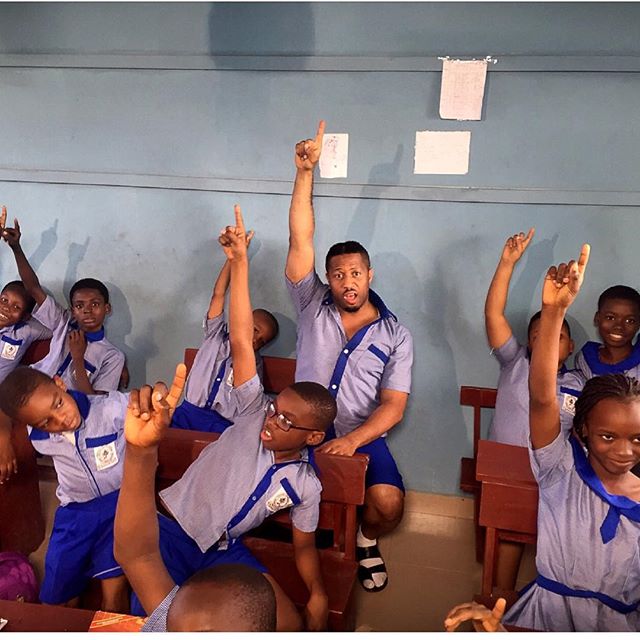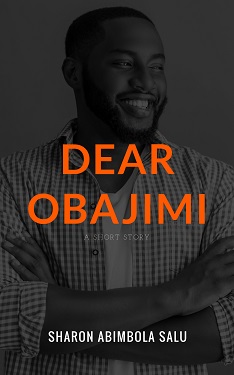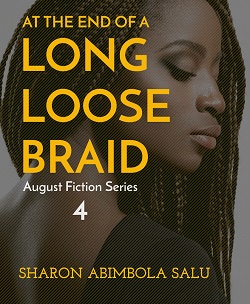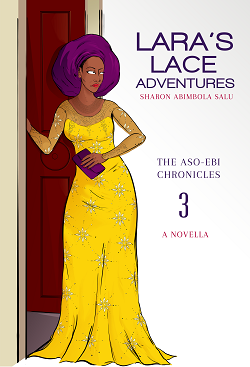Hello, there! How was your weekend? More restful than mine, I hope. 🙁 In this episode of our current series, The Day I Will Never Forget, Ezekiel’s parents see his report card and it opens the door to many questions.
And in case I don’t see you before October rolls in, Happy New Month in advance!
Have an awesome week.
Enjoy!
Episode 8: Show Me Your Report Card
The sound of approaching footsteps startled the lovers out of their “romantic moment.”
It also signaled the end of my spying.
None of us waited to see who was coming. It did not even matter. The last thing I saw before springing out of my hiding place and hightailing it back to my classroom, was Uncle Henry hastily pulling his cap and sunshades back on, before pulling away from Miss Agbo.
To the casual, unknowledgeable observer, they appeared to be having a normal conversation, as they stood a respectable distance from each other.
But I knew better.
Yet, it still didn’t make sense to me.
Two things in particular, bothered me.
First, why was Uncle Henry, instead of Mr. Adelaja, dressed as Father Christmas?
Second, if Uncle Henry and Miss Agbo were as close, and as involved as I was inclined to believe, judging from the intimate moment I had just witnessed, why wasn’t I benefitting from this relationship?
For one thing, Miss Agbo had awarded the prize for the composition to Timi. What was the point of dating my uncle if my grades did not get a positive boost from my uncle’s love interest?
So many questions ….
They bombarded my mind as I hurried back to class, well ahead of Miss Agbo.
She eventually arrived a few minutes after I made it back to class.
Before she arrived, however, Bright had helped me solve the first mystery: the disappearance of Mr. Adelaja.
As I walked to my seat, I observed that our classroom had become a playground of sorts. Some students, mostly boys, were drumming on their desks. Two girls stood in a corner, facing each other and playing a game of Tinko.
Another set of girls had taken over another corner of the classroom towards the back, and were deeply engrossed in a game of Ten-Ten. At the time I entered the class, one of them was calling out:
“Twenty, Twenty–” whilst the other girls clapped to the rhythm, sticking out their feet at the appropriate intervals. It looked like a well-choreographed dance, innocent enough.
But I had seen enough games of Ten-Ten in my life to know that it would end in deep disagreement as to who had really won, with false accusations slung like mud by bitter losers at the winning party.
And I know now, that even a simple game of Ten-Ten can morph into a lifelong family feud, separating close friends, depending on how vindictive the girls are.
But at the time I entered the classroom, the Ten-Ten players were just warming up. There was no name calling.
Yet.
Good! I was in no mood to get mixed up in the pettiness of girls that afternoon. I was bound to get mixed up if they started fighting because Bright as Class Captain was in charge in Miss Agbo’s absence, and would assuredly call on me for backup.
However, I did have some scores to settle with a certain “senior girl” who happened to be my class teacher, Miss Agbo.
I had barely sat down when Bright leaned towards me and said in a voice loud enough for me to hear, but too low for the amebos sitting behind us to hear and broadcast.
“I know why Mr. Adelaja didn’t come to school today,” he began, eyes shining brightly, and living up to his name with every passing second.
“How did you know he wasn’t Father Christmas?” I asked, surprised and a little worried that perhaps while I had been out playing “super spy,” someone else could have been keeping tabs on me.
But that wasn’t the case, as Bright explained.
Turning slightly in his chair, so that he could comfortably point in the direction of the Ten-Ten playing crew, he singled out the one who seemed the most invested in the game, and was apparently giving it her full concentration.
Her name was Tomi.
“You know Tomi?” said Bright after pointing her out to me, so that I would be in no doubt as to who exactly he was referring to.
“Yes,” I replied. “Shebi she’s in our class?” I said, stating the obvious.
“Um-hmm,” said Bright, nodding in agreement. “Her big sister is the Class Captain of P5 Effiong, and that one told her that Mr. Adelaja’s father died.”
I held my hand over my mouth in shock.
“How old was his father?” I asked, as if that would make it easier to swallow.
“100, I think. I don’t know. But he was sha old.”
I found myself wondering how Mr. Adelaja, who to me, looked quite ancient, and very much like he had climbed out of another century, could have a living parent. I also wondered if the old man had had tribal marks like his son, or if Mr. Adelaja had inherited his large nose from his father.
Bright left me to continue wondering, because at that moment, Miss Agbo returned from her mini-rendezvous with Father Christmas and immediately called Bright to her desk.
In his absence, I was left to piece together what had really happened from what Bright had told me and what I knew. These were my conclusions:
The day Mr. Adelaja had to leave suddenly, probably to visit his hometown on account of his father’s sudden death, the position of Father Christmas was left vacant.
As Miss Agbo was part of the Christmas Party Planning Committee, she had been called that Wednesday to the Headmaster’s office to inform her of this unexpected development. She had been given the task of finding a replacement, and had somehow managed to convince Uncle Henry to take up the challenge of playing Father Christmas for a day. None of the other male teachers were available as they had to oversee their classrooms and prepare for the end of term.
Essentially, an outsider was the perfect candidate for the job.
That outsider happened to be my uncle.
At least, that was how I imagined the events had happened.
But, I had to suppress the urge to confirm the true story from the horse’s mouth, for to do that would mean revealing two important and potentially incriminating facts: first, that I knew Father Christmas did not exist except in the minds of smaller, younger and particularly ignorant kids.
Second, and more importantly, I would be forced to reveal how I came to discover that Uncle Henry was Father Christmas.
I decided against it.
Besides, the issue of the soon-to-be-revealed report cards made me wary of rocking the boat with my parents, who Uncle Henry would surely tell of my misdeeds. I could be sure that if I did not perform as they expected, they would blame it on my spying on Father Christmas.
So, I kept my mouth shut, and resolved that either I would have to get answers some other way, or else I had to forget about this Father Christmas palaver and just accept my own version of events.
Meanwhile, Miss Agbo had called Bright away to her desk for three separate reasons.
First, the left over Christmas decorations that needed to be redistributed.
Second, the exercise books and textbooks in the store that had to be returned to each student. And third, the school-sponsored lunch, which would commence at break time.
First, the Christmas decorations.
Close to Christmas, Miss Agbo had announced to us that we would have to bring Christmas decorations to class, and we would also make our own decorations.
The ones we bought – shiny, green or red foil-like decorations – were set aside to adorn the public and shared spaces of the school such as the computer room, French room and unsurprisingly, the Headmaster’s office.
But, we also had to make decorations by hand as part of a crafts project championed by Miss Agbo.
We took colored rectangular strips of paper, glued each piece to form a complete circle, or in some cases, an oval, and then we linked these to other strips of paper with more glue, so that we ended up with a colorful chain of paper.
Then we hung them in the windows of our classroom so that parents could see them as they entered the school and rest assured that their money was not going to waste.
But by the end of the term, the decorations we bought were more than the school required, since each class was asked to make the same contribution. This was why Miss Agbo deemed it necessary to return the leftover decorations to her students. That was the first task Bright was saddled with.
Second, Miss Agbo told Bright to go to the store at the back of the classroom to retrieve the exercise books and textbooks we had used that term.
Here, Bright called for my assistance because he had just two hands, and each student had at least nine exercise books for each subject, including Mathematics, English Language, Social Studies, Religion, French, Computer Science, Fine Arts, Music and of course, Science.
Third, as Class Captain, Bright had to go to the Headmaster’s office to let him know how many bowls of food and bottles of drink we needed in our class. Miss Agbo wrote the relevant details on a piece of paper, which Bright delivered to the Headmaster’s office.
Then, we waited for break time to come.
As soon as the bell rang for break time, no one stirred from his or her seat.
Anyone who was foolish enough to head to the playground for the sole purpose of monopolizing the swings on the day they were giving away free food, would suffer the consequences of his folly by forfeiting the only meal the school gave us free of charge in the entire school term.
Who would bypass such a treat?
The child who would do so had certainly not been born.
We all sat still and waited.
From the other classrooms, we could hear shouts of joy and clapping as the caterers arrived at each classroom, followed by the men carrying crates of cold, soft drinks, which we called “minerals.”
They started with Primary 1 and eventually got to our class: Primary 3 Agbo, or “P3 Agbo” for short.
As soon as we saw the unfamiliar faces of the caterers, our class erupted in loud cheers, whistles and clapping.
We were not excited to see these people.
No.
Rather, we were interested in the gifts they came bearing: coolers stuffed with bowls of jollof rice or fried rice, fried plantains and the final jewel in the crown that made climbing the mountain of jollof rice so worth it: a blackened, deep fried piece of meat which we had to trust had come from an animal with four legs.
I was sure that if any child opened his plastic bowl of food and discovered that the piece of meat was missing, he would burst into tears, throw himself on the floor and roll from one end of the class to the other, like those overly dramatic people sharing testimonies in church.
Fortunately, that did not happen.
Amid the noise and premature celebration, bowls of food and bottles of drinks landed on the desks of students, and Miss Agbo, who did absolutely nothing to silence us.
Then, we all prayed and munched away.
When break time was over, our teacher made us put our books in our bags, and then we waited on pins and needles for the grand finale: our report cards.
For a primary school student, the school report card is a life and death matter. Receiving this single document, or in our case, booklet, was like having judgment passed for or against you by the Judge, who in this story, was Miss Agbo, backed of course, by the school, which might as well be the government as far as we were concerned.
That report card was the culmination of a student’s progress, or lack of it, over the course of an entire school term, and for the third term in particular, it spelt the difference between getting promoted to the next class or repeating a class.
The fact that the report cards contained our first term grades, not our third and final term grades, did not diminish their importance in the eyes of the powers that mattered: our parents and guardians.
Some students would take these report cards home to show their parents with the result being either praise or abuse showered liberally on the student, depending on the parents’ expectations.
But other parents who either had no patience to wait for the report cards to come to them, or held a certain level of distrust for their children, or just wanted an opportunity to ask the class teacher direct questions stemming from the report card, would show up on the last day of class, ready for action.
Some parents came to school on that day, specially armed with belts, horse whips popularly called koboko, freshly plucked canes, and all sorts of flogging devices to show exactly how they felt about their children’s grades.
Yes, the report card was deeply personal for both students and parents, so you can imagine the tension in my class when Miss Agbo told us she was about to distribute them.
There was no jollof rice on anybody’s mind in that moment. Just raw fear.
After making this much-awaited announcement, Miss Agbo stacked the report cards on her desk, and then temporarily abandoning them, she walked to the front of the classroom and announced the names of the top three students:
1st Position – Bright Amadi
2nd Position – Foluke Coker
3rd Position – Timi Tuvo
Bright’s position as Number 1 did not come as a surprise to me. It was a record he had held in his former classes, all the way from Primary 1 to Primary 3.
But I was a bit surprised that Timi came third. His outstanding performance in the English Composition had suggested that he would at least come in second, but that did not happen.
Notwithstanding the announcement of the top three students, my greatest concern was my own report card.
Miss Agbo gave each student his report card just as the closing bell rang. She made us turn our chairs upside down and lay them on our desks, where they would remain till the start of the second term in January.
Then, we prayed and she dismissed us.
After the closing prayer, I gathered enough courage to open my report card.
On the first page, in the top right hand corner, was a passport-sized picture of my younger self, probably taken in Nursery School. Further down the page, was a profusion of vital statistics: name, date of birth, blood group and so on.
Useless Details! I thought to myself.
I flipped through the pages, past the results from Primary 1 and 2 and now Primary 3, First term.
At the top of the page, in the section titled “Position,” I saw it.
4th.
Arghh! So close … Oh, I was so, so close.
You see, my father had promised me a very special gift if I managed to get into the top three.
But now that I had confirmed that I was 4th in my class, that gift was out of the question.
Although it was a marked improvement from my Primary 2 Final Term position of 8th place, I knew that for my parents, it was still not good enough.
My eyes scrolled through each subject and scanned the assigned grade.
No grades in red.
Good.
It meant I had not failed any test or assignment.
But I still wanted an explanation for my position as the 4th student in class.
I looked for my scores in English Language and paused. My overall score was 88.
88 in English? How come?
Then, it occurred to me that maybe my final composition had lowered my overall score, which as far as I knew averaged at least 90 before that assignment was given.
So, for the first time that day, I pulled out my English exercise book and looked at the grade for the composition I had submitted.
75%.
There were several words underlined in red ink and some handwritten comments in the margins that I did not bother reading.
How did I end up with 75% for an assignment my father and I painstakingly worked on?
I had no idea, but I knew one person who certainly had the answers: Miss Agbo.
Seeing no student at her desk at that moment – they were all busy absorbing the contents of their report cards – I quickly approached my teacher, and asked her in a sad voice:
“Auntie, you gave me 75% on my composition. Why?”
Miss Agbo sighed deeply and then responded:
“Ezekiel, I loved your piece, but I had a lot of issues with it. You know what? Are your parents coming to pick you up today?”
“Yes, ma,” I replied wondering what that had to do with anything.
“Okay. When they come for you, tell them I want to see them, ehn? Don’t forget o.”
“Okay, Auntie,” I responded, deeply dissatisfied with her answer and reaction.
Why couldn’t she just tell me her issues with my work? After all, it was my report card, wasn’t it? And why bring my parents into the matter?
I had no choice but to wait and see.
My parents had come to school not quite long after that, but had gone to see Nnamdi’s teacher first. As I learnt later that afternoon, my brother, Nnamdi came 2nd in his class.
By the time my parents arrived in my classroom, they were in high spirits. My father still wore his work clothes, having taken off early from the office, while my mother wore a cheerful, bright yellow wrapper and blouse with matching head tie.
They had left Nnamdi in his class to gather his belongings together while they spoke with my class teacher, Miss Agbo.
At the time they entered the classroom, there were still a few students loitering about, but most of them had already left.
Five parents were waiting to see Miss Agbo, so my parents had to wait for their turn.
In the meantime, my father had returned my greeting of “Good Afternoon, sir” with “Show me your report card.”
I obeyed and waited with bated breath for the reaction of both parents.
I had already witnessed the merciless belt-administered flogging of Olawale, the boy who came last in the entire class, by his father who promised him even more whipping when they got home.
I prayed my parents would be more merciful. After all, 4th position was not the same as 22nd position in a class of 22.
As I had seen Olawale’s father remove his belt inch by inch, as he scrutinized the boy’s report card, pausing every now and then to yell expletives at the poor boy, I stood a few feet away from my parents as they scanned through my report card, making sure I was not too far from the exit.
My father spoke first.
“Ezekiel, come here!” he commanded.
I obeyed and came closer, but still not close enough because my mother shouted:
“Didn’t you hear your father? My friend, move closer! Abi isn’t this your report card?”
“Yes, ma,” I replied and came to stand on the exact spot on the ground she was pointing to. To her, that was where “move closer” meant, and it was close enough to get a backhand slap if need be. The memory of the backhand slap she had given me in Primary 2 when I came 8th, was still fresh in my mind.
But like they say at the end of Nollywood movies, “To God be the glory,” I did not get slapped.
What happened, however, was that my parents demanded to know why I was not in the top three and most especially, why I did not take first position.
“That boy who came first … What’s his name?” my father demanded, in a tone that suggested he would rather have seen that first position on my own report card instead of referring to another student.
“Bright, sir,” I replied.
“”Bright what? Doesn’t he have a surname? Or is it Bright Ness?” That was my mother.
“It’s Bright Amadi, ma” I replied.
“Ezekiel, isn’t this Bright your seatmate–” began my father.
“–And even the eh … Class Captain?” said my mother.
“Yes, Daddy. Yes, Mummy.”
“Does he have two heads?” asked my mother.
Typical question.
But I did not dare say that to her face.
“No, Mummy,” I replied.”
“So, how can you be sitting beside the boy who came 1st and you came 4th?” my father asked.
For this question, I had no answer.
Apparently, my parents believed that Bright’s brilliance ought to have rubbed off on me enough to yank me up to at least 2nd position.
It didn’t happen.
“Talk now,” said my mother, eyeing me with a less than pleasant look.
Just then, a female voice greeted my parents from behind.
It was Miss Agbo.
“Good Afternoon, Mr. and Mrs. Ezekobe.”
“Good Afternoon to you too,” my father began, “but the afternoon would’ve been better if this boy had come first.”
Miss Agbo smiled the same calm smile she had served to every single parent, who had made similar comments that afternoon.
Then, she gave them the standard answer she gave all the other parents.
“I understand your concern, sir, but everyone cannot be first. Your son really tried. You should be proud! He came 4th, and don’t forget this is the first term. He still has second and third term to pull up his grades.”
That answer did not satisfy my parents and they made it abundantly clear.
“Ehn, Miss Agbo, what can he do to improve next term?” my mother asked.
“For starters, his weak subjects are Maths, English and Science. And when I say “weak,” I use that term loosely. Ezekiel is still doing a lot better than the majority of the class. If he can improve in those subjects, he should be in the top three next term,” said Miss Agbo confidently.
“Okay. Now this one that you said he’s weak in English, what do you mean? Are you saying his grammar is not good enough?” asked my father.
“No, not at all. That composition I gave them towards the end of the term really pulled down his grades,” began Miss Agbo.
Shock was written on my parents’ faces.
“How is that possible?” said my mother. “His father helped him with that homework, and I even helped him edit it.”
“Yes, we put together a collage of stories. How can that pull down his grades?” said my father whose face wore the same look of surprise that was plastered on my mother’s face.
“Okay. Let me explain,” said Miss Agbo.
And she did.
“A collage is … was a great idea. An excellent idea, but it’s too much. You tried to cram too many details into 500 words, and the stories did not add up. They didn’t even blend well together. The composition asked the children to describe one day they would never forget. Some wrote about falling off bicycles and injuring themselves, and one even wrote about travelling abroad for the first time.”
“Was that what Timi wrote, Auntie?” I asked.
“No. That was another student. Timi is the student who won, by the way,” said Miss Agbo to my parents, who looked like they were mentally rejecting her detailed explanation.
“Okay. We’re listening,” said my father in a voice that suggested that my teacher still had some work to do to convince him that his son deserved to have points taken off his project. Miss Agbo sensed this, and continued.
“Like I was saying, Mr. and Mrs. Ezekobe, the stories did not add up. It was obvious to me that you had taken a couple of stories and joined them together. There was no way all those events could have happened on the same day. For example, Ezekiel said he travelled from Lagos to Enugu and then to Abuja and then to Port-Harcourt all on the same day.”
“But that is possible now–” began my father protesting.
“Yes, but not by road. He wrote that he visited these places by road on the same day. Not possible. By air, maybe. But if it was by air, he should have said so. I have to work with what he wrote down.”
My parents kept quiet and listened.
“Then, I had issues with the use of language. He used some words that were waaaayyy too advanced for his age, so I knew you must’ve helped him.”
“But Miss Agbo, are you telling me that in your entire class, it was only my son who made all these mistakes? Didn’t other children’s parents help them with their homework too?” my father queried.
“Of course they helped them. I expected it, but I didn’t want you to make it so obvious. For those who made it obvious that their parents helped them, I deducted points too just like I did with Ezekiel. A boy of Ezekiel’s age has a limited vocabulary, and I know because I mark his homework regularly and I’m familiar with his reading and writing level.”
“So, in short ehn, too much big, big grammar, abi?” said my father chuckling.
“Unfortunately, yes, sir,” said Miss Agbo smiling.
But my mother still looked furious.
Miss Agbo continued, this time directing her answers more towards my mother.
“Also, the boy who won – Timi – his composition was full of imagery, emotions and he made me feel like I was on that plane with him. Oh, sorry! He wrote his composition on his first plane ride within the country. He talked about how he was scared the plane would crash because of turbulence, and so many other things. But Ezekiel’s story, although in fairness to him, was more detailed than Timi’s own, was more mechanical in delivery.”
At the word, “mechanical,” I saw fire leap from my mother’s eyes and if Miss Agbo was a sheet of paper, there would have been only black ashes standing in her place after that.
But nothing happened to Miss Agbo.
She could see my mother’s annoyance, but she stood by her decision.
“So, to conclude, and for the sake of next term, let me tell you what I tell my students: K.I.S.S – Keep It Simple Students,” said Miss Agbo, and then addressing my father in particular, she said “Keep It Simple Sir,” and finally to my mother, she said, “Keep It Simple Senora.”
My mother who neither understood Spanish nor had any inclination towards learning or speaking any foreign language, just said, “We’ve heard you. What about his other subjects?”
Miss Agbo took that as her cue to move on to another topic, and she did.
After satisfactorily discussing my report card with Miss Agbo, my father thanked her for her patience and wished her a Merry Christmas in advance.
But my mother grudgingly gave a dry, plastic smile and nodded when Miss Agbo greeted her with “Compliments of the Season to you too, Madam.”
With that we went to fetch Nnamdi from his classroom and went to my father’s car, which was parked outside our school gate.
As soon as we entered the car, my mother broke her silence.
“K.I.S.S my foot!” my mother fumed. “Look, Papa Nnamdi, I’m not buying that Miss Agbo’s stories at all. If she wanted to give this boy 90-something, she would’ve done it. He would be in the top three at least and we wouldn’t have wasted our time listening to all the excuses she gave. She can go and eat her yeye explanations! Nonsense!”
“No, no calm down, Chioma. Are you not the one who told me she’s going out with Henry? I’m sure we’re not the only ones who know. The school authorities probably know too, and if they see her dashing Ezekiel points anyhow it will look like ojoro! Imagine if you were the parent of one of those other children who later learns that the child who won first prize is the nephew of the class teacher’s boyfriend. Ahn ahn! It will look like favoritism. I think she was fair.”
“Ojoro or no ojoro, if not because you came to their school today, I would’ve taken it up with the Headmaster,” said my mother still sulking.
“Let it go, Chioma. Let’s move beyond this please. These boys did well this term, especially Nnamdi. Don’t rubbish it because of one composition,” said my father as he drove the car off the school property.
My mother shrugged and reluctantly dropped the matter.
But I could tell that it really pained her.
Later that evening, we were surprised by a visit from the last person we expected to see on a Friday.
It was Uncle Henry.
… to be continued …
*Image Credit: Laila’s Blog










Hiya,
Senior girl Agbo is the best, she’s so lovely.
Reminds me of the time my niece went to school with her colouring homework. Her teacher advised that she be allowed to do her homework herself, as there was no way that a 2 year old would have coloured so precisely without getting some colour outside the lines of the shapes. Lol
“…even a simple game of Ten-Ten can morph into a lifelong family feud”, Ah! memories XD 😀
“Does he have two heads” is the official anthem of Nigerian parents. Papa Ezekiel is such a jolly good fellow.
Well written Sharon.
Have a lovely week!
Nedoux: Lol @ Senior Girl Agbo! It sounded different coming from you. ?
Oh my goodness, what happened to your niece is proof that teachers notice these things … Like Miss Agbo, ba? It seems like teachers aren’t looking for perfection with these assignments. Just effort, maybe.
Yes indeed … Lots of memories with ten-ten. And yes you’ve summed it up nicely: THAT statement is the official anthem of Naija parents. I think they have to say it at least 2ce a day so they don’t max out their quota for the week.
I look forward to doing the same to my kids.
*wicked grin*
Thanks for commenting and have a great week too!